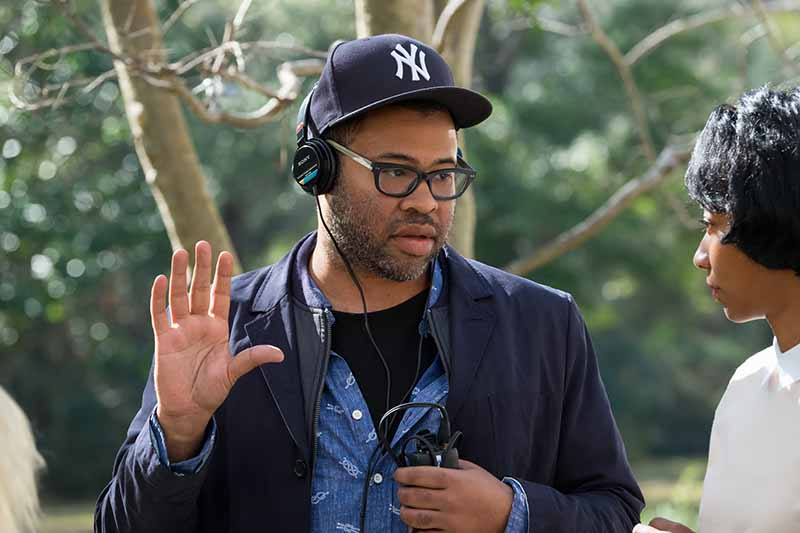 When most audiences hear the name Jordan Peele, they think of one-half of the brilliant duo of Key and Peele and the star of Keanu. An actor known as much for his comedic writing as he is for starring in film and television comedies, Peele has long been a fan of horror movies and believes that terror and comedy draw from the same well of inspiration.
When most audiences hear the name Jordan Peele, they think of one-half of the brilliant duo of Key and Peele and the star of Keanu. An actor known as much for his comedic writing as he is for starring in film and television comedies, Peele has long been a fan of horror movies and believes that terror and comedy draw from the same well of inspiration.
Peele believes that both are grounded in our need to explore the absurdity of our humanity. He appreciates the fact that we deal with our troubles and fears through the visceral, cathartic experience that comes from laughing or allowing ourselves to become scared. In sum, if we can master the emotions, we can move through the experience.
No stranger to mining the absurd from reality, when he began the screenplay, Peele outlined a premise that was equal parts terrifying and social commentary. The result was Get Out, a provocative thriller that blended humor, satire and horror…and wasn’t afraid to tackle the current state of race relations in America head on.
“This idea came from my wanting to contribute something to the genres of thriller and horror that was unique to my voice,” he says. “The fact that it goes to race goes to the area I’ve worked in a lot, which is comedy. This was a movie that reflects real fears of mine and issues that I’ve dealt with before.”
Peele imagined a protagonist named Chris, an African-American photographer and artist in New York City who is taking his relationship with his Caucasian girlfriend to the next level by meeting her parents over a long weekend.
As soon as Chris arrives at the family’s rural, upstate home, he begins to suspect that everything is not as it seems. When he discovers that a number of black men have gone missing in that suburb, his suspicion reveals itself to be more than unfounded paranoia. What starts out as a mundane, obligatory weekend spirals and builds toward a crazy, horrific, thrilling, terrifying, and likewise fun, conclusion.
The filmmaker admits that he enjoys playing with the audience’s expectations of what could happen and upending a foregone conclusion. “A big piece of the premise to Get Out is that you have white girl bringing a black guy home, and she hasn’t thought through all of the social ramifications of that,” Peele gives. “She assumes her family is going to be fine with it. They turn out to be, but there are some subtler works at play that we begin to see a part of something much more sinister.”
This series of not-quite-right moments that make Chris more and more suspicious unfold slowly. Whether it is curiosity about the odd behavior of the Armitage’s help—or feeling like he stepped into another world during the family’s annual celebration of their departed grandfather—Chris realizes that he isn’t the one who is going insane.
“The trick was to make sure that nothing so crazy happened so fast that we wouldn’t believe the characters would stay in this situation,” Peele reveals. “The element that starts to alarm Chris is meeting the help, and finding that they’re a little off. “They’re not like anybody he’s ever met.”
- (L to R) Missy (CATHERINE KEENER), Dean (BRADLEY WHITFORD), Rose (ALLISON WILLIAMS), Georgina (BETTY GABRIEL) and Chris (DANIEL KALUUYA) in Universal Pictures’ “Get Out,” a speculative thriller from Blumhouse (producers of “The Visit,” “Insidious” series and “The Gift”) and the mind of Jordan Peele. When a young African-American man visits his white girlfriend’s family estate, he becomes ensnared in a more sinister real reason for the invitation.
- Rose (ALLISON WILLIAMS) connects with boyfriend Chris (DANIEL KALUUYA) in Universal Pictures’ “Get Out,” a speculative thriller from Blumhouse (producers of “The Visit,” “Insidious” series and “The Gift”) and the mind of Jordan Peele. When a young African-American man visits his white girlfriend’s family estate, he becomes ensnared in a more sinister real reason for the invitation.
- Writer/director/producer JORDAN PEELE on the set of Universal Pictures’ “Get Out,” a speculative thriller from Blumhouse (producers of “The Visit,” “Insidious” series and “The Gift”) and the mind of Peele. When a young African-American man visits his white girlfriend’s family estate, he becomes ensnared in a more sinister real reason for the invitation.
- Writer/director/producer JORDAN PEELE on the set of Universal Pictures’ “Get Out,” a speculative thriller from Blumhouse (producers of “The Visit,” “Insidious” series and “The Gift”) and the mind of Peele. When a young African-American man visits his white girlfriend’s family estate, he becomes ensnared in a more sinister real reason for the invitation.
- (L to R) Logan (LAKEITH STANFIELD) meets Chris (DANIEL KALUUYA) in Universal Pictures’ “Get Out,” a speculative thriller from Blumhouse (producers of “The Visit,” “Insidious” series and “The Gift”) and the mind of Jordan Peele. When a young African-American man visits his white girlfriend’s family estate, he becomes ensnared in a more sinister real reason for the invitation.
- Chris Washington (DANIEL KALUUYA) is the guest of a very odd garden party in Universal Pictures’ “Get Out,” a speculative thriller from Blumhouse (producers of “The Visit,” “Insidious” series and “The Gift”) and the mind of Jordan Peele. When a young African-American man visits his white girlfriend’s family estate, he becomes ensnared in a more sinister real reason for the invitation.
- Chris (DANIEL KALUUYA) with girlfriend Rose (ALLISON WILLIAMS) in Universal Pictures’ “Get Out,” a speculative thriller from Blumhouse (producers of “The Visit,” “Insidious” series and “The Gift”) and the mind of Jordan Peele. When a young African-American man visits his white girlfriend’s family estate, he becomes ensnared in a more sinister real reason for the invitation.
- BRADLEY WHITFORD as Dr. Dean Armitage in Universal Pictures’ “Get Out,” a speculative thriller from Blumhouse (producers of “The Visit,” “Insidious” series and “The Gift”) and the mind of Jordan Peele. When a young African-American man visits his white girlfriend’s family estate, he becomes ensnared in a more sinister real reason for the invitation.
- Drs. Dean (BRADLEY WHITFORD) and Missy Armitage (CATHERINE KEENER) in Universal Pictures’ “Get Out,” a speculative thriller from Blumhouse (producers of “The Visit,” “Insidious” series and “The Gift”) and the mind of Jordan Peele. When a young African-American man visits his white girlfriend’s family estate, he becomes ensnared in a more sinister real reason for the invitation.
- CATHERINE KEENER as Dr. Missy Armitage in Universal Pictures’ “Get Out,” a speculative thriller from Blumhouse (producers of “The Visit,” “Insidious” series and “The Gift”) and the mind of Jordan Peele. When a young African-American man visits his white girlfriend’s family estate, he becomes ensnared in a more sinister real reason for the invitation.
- MILTON “LIL REL” HOWERY as Rod Williams in Universal Pictures’ “Get Out,” a speculative thriller from Blumhouse (producers of “The Visit,” “Insidious” series and “The Gift”) and the mind of Jordan Peele. When a young African-American man visits his white girlfriend’s family estate, he becomes ensnared in a more sinister real reason for the invitation.
- ALLISON WILLIAMS as Rose Armitage in Universal Pictures’ “Get Out,” a speculative thriller from Blumhouse (producers of “The Visit,” “Insidious” series and “The Gift”) and the mind of Jordan Peele. When a young African-American man visits his white girlfriend’s family estate, he becomes ensnared in a more sinister real reason for the invitation.
- DANIEL KALUUYA as Chris Washington in Universal Pictures’ “Get Out,” a speculative thriller from Blumhouse (producers of “The Visit,” “Insidious” series and “The Gift”) and the mind of Jordan Peele. When a young African-American man visits his white girlfriend’s family estate, he becomes ensnared in a more sinister real reason for the invitation.
- (L to R) Logan (LAKEITH STANFIELD) meets Chris (DANIEL KALUUYA) in Universal Pictures’ “Get Out,” a speculative thriller from Blumhouse (producers of “The Visit,” “Insidious” series and “The Gift”) and the mind of Jordan Peele. When a young African-American man visits his white girlfriend’s family estate, he becomes ensnared in a more sinister real reason for the invitation.
- BETTY GABRIEL as Georgina in Universal Pictures’ “Get Out,” a speculative thriller from Blumhouse (producers of “The Visit,” “Insidious” series and “The Gift”) and the mind of Jordan Peele. When a young African-American man visits his white girlfriend’s family estate, he becomes ensnared in a more sinister real reason for the invitation.
Photos courtesy of Universal Pictures
















